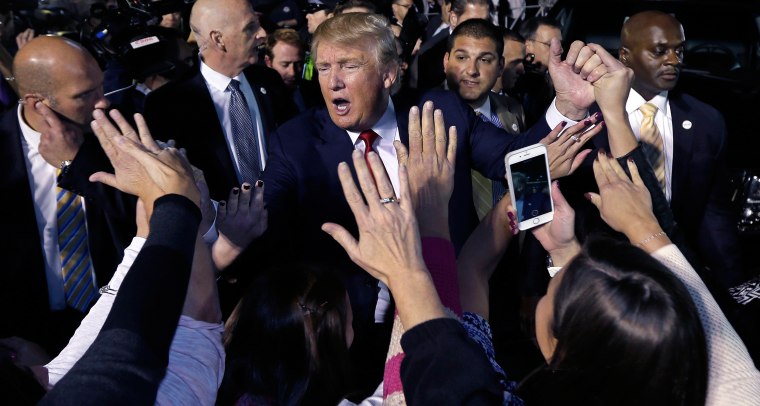Former South Carolina Republican Party chair Katon Dawson is beginning discussions with GOP donors to start raising money for a new super PAC to take on Donald Trump in the Palmetto State, the latest illustration of growing worries among more establishment Republicans that the real estate mogul could become the party’s nominee.
Dawson, who ran a super PAC that backed Sen. Lindsey Graham’s successful 2014 reelection effort, says he is looking to raise more than $2 million to fund an effort that would include television ads but also on-the- ground efforts to highlight Trump's controversial remarks, more liberal positions on some issues and to raise doubts about Trump's ability to win the general election. South Carolina is the third state in the GOP primary process, and polls show Trump leading there, as well as in Iowa, New Hampshire and nationally.
Dawson’s comments come as the head of the Club for Growth, a conservative anti-tax group, told the Washington Examiner this week he is also trying to raise millions to fund some kind of broader effort to defeat Trump. The group already spent $1 million in ads this summer arguing that the real estate mogul is not a true conservative.
“There was a fair amount of denial early on that Donald Trump could win the primary. When you have a 30-point number in South Carolina [Trump is getting more than 30 percent of the state’s vote in current polls], that tells me he can win the primary. You will have to stop Donald Trump,” said Dawson, who was an adviser on Rick Perry’s campaign until the former Texas governor dropped out last month.
“It’s about telling the story of what it will look like if he’s our nominee, 'this is how many [GOP] congressmen will lose if Trump is the nominee,” said Dawson.
Dawson’s comments reflect a shift in thinking among key party operatives and officials, many of whom strongly oppose Trump and think his nomination would guarantee the victory of Democrats in next fall’s general election. Many party operatives dismissed Trump's rise during the summer, arguing it was simply because of the nearly constant coverage Trump receives from the news media and that voters would tire of his approach.
Now, veteran Republican operatives argue that while Trump seems to have peaked at about 30 percent of the vote in most polls, such a rise is substantial, particularly with 14 other candidates splitting the rest of the GOP electorate.
“There is a big part of the party that is against him, but they have not necessarily mobilized against him,” said Katie Packer Gage, who was deputy campaign manager for Mitt Romney in 2012. “But I think that’s coming.”
“At some point, somebody is going to have to run ads against this guy,” said Gage.
In part, the Republicans are suffering from a collective action problem: there is a strong incentive to have Trump attacked, but not a single major part of the GOP motivated to do it.
Many senior Republicans, including Romney, say that GOP voters will shift away from the real estate mogul as the voting nears, so they have not yet mobilized their backers against Trump. Other top Republicans are for now pushing their favorite candidates instead of concentrating on defeating Trump, with George W. Bush raising money for his brother Jeb and John McCain campaigning for Graham, one of his closest friends.
Top congressional leaders on Capitol Hill, while opposed to Trump, privately believe that unifying against the mogul could help Trump politically, allowing him to emphasize to voters the “establishment” is against him.
And for some Republicans, Trump is not the greatest enemy. America Rising, a conservative outside group run by some of Romney’s former top aides, is spending money attacking Hillary Clinton. Conservative talk radio hosts, while not uniformly behind Trump, view their true enemy as Jeb Bush and are for now content to blast him.
“The pro-Trump support is united, the non-support is divided,” said Henry Olsen of the conservative Ethics and Public Policy Center.
The anti-Trump parts of the GOP, says Olsen, “need to have an organizer.”
Dawson is looking to play such a role. But he, like other anti-Trump Republicans, says that taking on the mogul is still not an urgent cause.
“Voters break late,” said Dawson. “You have to really start coming after him the last two weeks of November, then December, then stay on message in January.”
